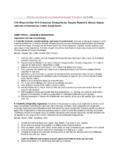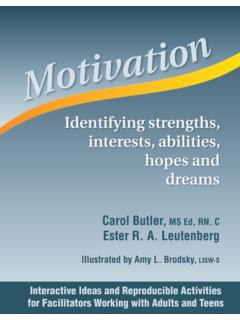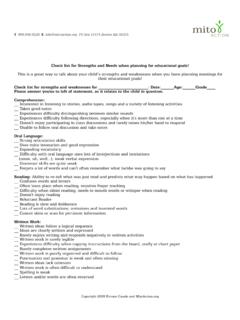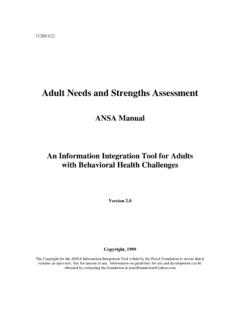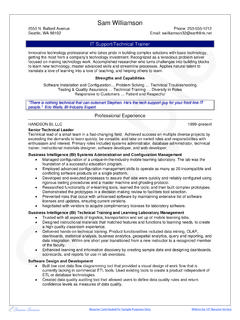Transcription of Strengths Perspective in Mental Health (Evidence …
1 strength Based Strategies - 2006 127 Strengths Perspective in Mental Health ( evidence Based Case Study) Rangan Aarti, Sekar K. Mental Health services are primarily concerned with early diagnosis and treatment, apart from preservation and promotion of good Mental Health and prevention of Mental illness. Over the past few years, a Strengths -based approach to case management with people with severe Mental illness has emerged. This paper reviews empirical evidence and illustrates an evidence based case study to validate the existing literature on the Strengths Perspective in treating Mental illness.
2 The exploration of the Strengths Perspective as it relates to the evidence based case study shows that the Strengths Perspective influences both the well-being and the coping of people with Mental illness. Introduction Psychiatry ascribes and uses the disease model in treating Mental Health problems and Mental illnesses. The tenets of the disease model of diagnosing the deficits are used to prescribe pharmacology and psychosocial treatment, to help the persons with Mental illness cope with their problems.
3 However, over the years, a shift in Perspective from the diagnostic approach to a more functional approach, using a Strengths -based approach to case management with people with severe Mental illness has emerged (Saleebey, 1992; Sullivan & Rapp, 1994; Weick, Rapp, Sullivan & Kisthardt, 1989). Though the Strengths approach, with its emphasis on growth and change, collaborative relationship, and the centre of change located in the client, is diametrically opposite to the pathology based approach used in treating Mental illness; it still shows promise in improving the well being and quality of life of persons with Mental illness (Saleebey, 1996).
4 This paper uses a case illustration to demonstrate how Mental Health professionals can assess the Strengths of the client, select tailored interventions and help the client improve their well being and quality of life. The Strengths Perspective The Strengths approach attempts to understand clients in terms of their Strengths . This involves systematically examining survival skills, abilities, knowledge, resources and desires that can be used in some way to help meet client goals (Saleebey, 1996).
5 The helping process from initial contact, goal identification, assessment and intervention to evaluation has the underlying assumptions that human beings have the capacity for growth and change (Weick, 1992), knowledge about one's situation (Early & GlenMaye, 2000), resilience (Garmezy, 1994) and membership (Walzer, 1983). The major focus in practice from the Strengths approach is collaboration and partnership between social workers and clients.
6 Other methods include environment modification and advocacy (Early & GlenMaye, 2000). This method has not only emerged as an approach to case management for people with severe Mental illness (Saleebey, 1992; Sullivan & Rapp, 1994; Weick, Rapp, Sullivan & Kisthardt, 1989), but also with other client groups. Literature indicates that Strengths Perspective influences both the well-being and the coping of people with Mental illness (Saleebey, 1996). The Strengths Perspective , along with its assumptions and strategies, is explored in this article as it relates to the case of a married woman who presented with problems to the Psychiatric Social Worker.
7 Case Illustration Mrs S, a 26 year old married female, from middle-socio economic status, semi-urban background, educated up to 12th standard, was diagnosed with Dysthymia, Marital discord and primary infertility. Her complaints included negative cognitions, suicidal ideations, reduced sleep and appetite, vague sensations in the body, abnormal beliefs that she will beget a child, negative feelings towards in-laws, husband and unresolved feelings towards her inability to beget a child and her religious affiliation.
8 Psychotropic medication has helped control suicidal ideations and depressed cognitions and she has undergone therapy with a social worker affiliated with a National Institute of Mental An assessment of Mrs S s case showed that her marital subsystem was not formed properly. Even after 6 years of marriage, the interaction between the spouses was minimal and need based and Mrs S was unable to conceive. The result of the infertility test stated that the patient had a weak uterus and her husband had low sperm count.
9 She also expressed her inability to efficiently carry out the household activities according to the expectations of her in-laws. Mrs S felt dominated by her husband and her in-laws who constantly criticized her for not meeting their expectations. strength Based Strategies - 2006 128 Mrs S changed her religion to Christianity, as she was told that Lord Jesus would help her to have a child. She told everybody that Jesus had come to her and had told her that she would beget a child.
10 However the pregnancy test was negative and she did not give birth to a child on the assigned date. All through the nine months of assumed pregnancy she kept making people believe that her stomach was bulged and used to treat herself as a pregnant lady. In the last six months, before the delivery date, patient stated having severe body sensations and depressed cognitions, which troubled her and prompted her to attempt suicide multiple times. Mrs S's therapist assessed that she had a protected childhood, was married at a very early age and thus was not mentally prepared to take on responsibilities after marriage.

